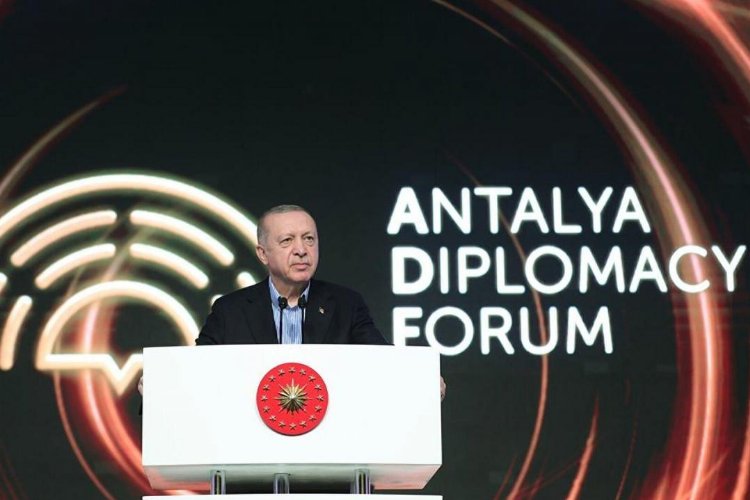Türkmen Terzi
The world has sharply diverged in its stance on the Russian invasion of Ukraine, with democratic countries siding with Ukraine, while a few autocratic regimes pledge support for Russia. The West has introduced the most severe economic and commercial sanctions on the regime of Vladimir Putin. Turkey, located strategically among three continents, successfully hosted the second Antalya Diplomacy Forum last week amid the ongoing war in Ukraine. The forum saw the Russian and Ukrainian foreign ministers at the same table for the first time since the beginning of the invasion. Around 2,500 high-profile guests including heads of state, together with dozens of ministers from around the globe, attended the forum to find solutions to global threats such as wars, the pandemic, terrorism and economic crises. The speech delivered by Turkish President Tayyip Erdoğan was undoubtedly a factor that cast a shadow over the forum as Erdoğan once again, as he has been so many times during his 20-year rule, was sanctimonious and duplicitous, opposing and speaking against many things he himself has been accused of doing.
NATO Secretary-General Jens Stoltenberg, Council of Europe Secretary-General Marija Buric, Prime Minister of Bulgaria Kiril Petrov, President of Slovenia Borut Pahor, Iraqi Kurdistan Regional Government (IKRG) President Nechirvan Barzani, President of Guinea-Bissau Umaro Embalo, President of Sierra Leone Julius Maada Bio, President of Niger Mohamed Bazoum and President of Liberia George Manneh Weah as well as South African Minister of International Relations and Cooperation Dr. Naledi Pandor were among the participants.
Topics such as democratic governance, energy security, artificial intelligence, racism, the fight against discrimination, the development of Africa, the Asia-Pacific region, the fight against disinformation, irregular migration, the fight against terrorism, women empowerment, climate change and reconsidering the European security landscape were among the many topics addressed during the forum’s 27 panel discussions.
After greeting all the participants and thanking them for accepting Turkey’s invitation to the forum, which was hosted in Antalya, a Mediterranean tourist destination famous for its history and culture, Erdoğan praised the success of the forum, saying that since the start of the Ukraine-Russia crisis, the first high-level contact between the two countries took place during the Antalya Diplomacy Forum. Although Russian Foreign Minister Sergei Lavrov and his Ukrainian counterpart, Dmytro Kuleba, met on the sidelines of the forum for talks, joined by Turkey’s Foreign Minister Mevlüt Çavuşoğlu, on March 10, the talks failed to lead to any progress.
Erdoğan spoke of how the rich become richer while hunger has killed more people than the coronavirus has. He also spoke of the blue waters of the Mediterranean becoming a graveyard for an estimated 25,000 migrants and refugees since 2014. The number of refugees exceeds 85 million worldwide, and over the past 15 days more than 2 million Ukrainian refugees have been added to this figure.
The irony is that Erdoğan has become one of the world’s richest presidents as his five notorious oligarchs, labelled the “gang of five” by opposition parties, are among the top 10 firms globally to receive public infrastructure contracts. Meanwhile, millions of Turks are struggling just to get by amid skyrocketing inflation.
Erdoğan mentioned how innocent civilians are dying in Yemen, Syria, Iraq and Libya but failed to mention his part in fueling the fires in these conflicts as his government chooses to pursue military solutions instead of using diplomacy. Erdoğan’s role in the Syrian refugee crisis in the Mediterranean cannot be underestimated. Turkey has been involved in the conflict in Syria by supporting jihadists since 2011, and Turkey’s direct invasion of northern Syria in 2019 resulted in the displacement of over 300,000 people and has caused the death of hundreds of civilians.
Erdoğan argued during his speech that “if the entire Western world had voiced their concern about the annexation of Crimea in 2014, would we have faced this current destruction of Ukraine?” But the same Erdoğan, the president of a country that has NATO’s second-largest army, purchased a Russian S-400 surface-to- air-missile system. Erdoğan has had strong ties with Putin since 2016 despite harsh criticism from the European Union and the US. Critics argue that Erdoğan is Putin’s Trojan horse in NATO.
Erdoğan also shared the heart-breaking details related to photos coming from Ukraine depicting the chaos and distress parents and children are currently enduring. While these visuals have apparently stirred something deep within him, Erdoğan has never shown a single drop of mercy for the innocent family members of his critics in Turkey. Erdoğan’s AKP continues to this day to accuse the faith-based Gülen movement of orchestrating a coup attempt on July 15, 2016, despite the movement denying any involvement in it and no evidence to suggest otherwise. The AKP, however, has ferociously continued with a Nazi-style witch-hunt against Gülen-affiliated individuals, not sparing even pregnant women, the elderly, kids, teachers, journalists or housewives.
Erdoğan told hundreds of dignitaries from Nepal to Bulgaria that as rulers they are collectively obliged to establish peace and prevent conflict throughout the world. Erdoğan, however, continues to act in a manner contrary to this, with his own government pursuing military measures against the Kurds in Turkey as well as with Turkish military forces being involved in conflicts in many parts of the MENA (Middle East and North Africa) region. Moreover, Erdoğan is currently in the process of arranging trips to Africa, where he plans to embark on a campaign to market combat drones produced by a Turkish company belonging to the family of his son-in-law Selçuk Bayraktar in every corner of the continent, while the African Union tries hard to put an end to armed conflict through diplomacy.
